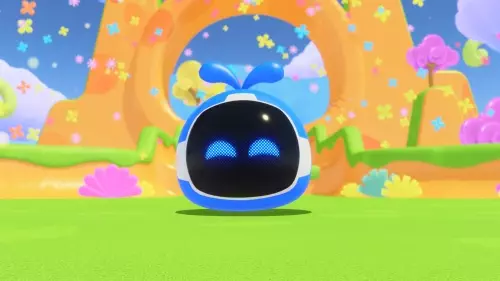
‘It is alright to fabricate a small sport:’ Astro Bot director Nicolas Doucet says little strategies like giant capability
Crew Asobi studio director Nicolas Doucet has a message for GDC 2025 participants fortunate enough to secure a spot in his crowded session ‘The Making of Astro Bot’: “It’s perfectly fine to create a small game.”
These are relevant insights in an era of expanding development cycles and budgets—and ones that should hold significance considering the critical and commercial success of Crew Asobi’s delightful platformer, Astro Bot.
To introduce his point, Doucet presents an image of Crew Asobi’s onboarding handbook that declares “we prioritize quality, not quantity.” It’s preferable to create a gourmet delicacy rather than a messy platter of overcooked sliders.
For Doucet, thinking small means gaining greater control over your creations and processes. It also implies your players are far more likely to actually finish the game—allowing you to compete more effectively for their limited time in an increasingly crowded market.
“The chance of a game you can genuinely finish is a very, very compelling argument [for small games],” he elaborates. “That meant being okay with the game being 12 hours long, but if it had been eight hours—and those eight hours were outstanding—we would have accepted that to maintain consistent quality.”
Doucet acknowledges concerns over game size are generally a “difficult bias” to overcome and admits the idea of creating a smaller title initially sparked debates at Crew Asobi HQ. Ultimately, however, the team realized they could capitalize on the advantages of adopting a more compact approach to maintain a clear scope and agile development on appealing concepts.
Related:‘Savor Me’ Wins Major Prize, Nuovo Award at the 2025 IGF Awards
This is a reality validated by the fact that Astro Bot was developed in just three and a half years—only six months longer than the team initially anticipated. Funding was managed by adjusting the pace of the studio’s ramp-up curve to accommodate fewer developers over an extended period.
With that philosophy of ‘simplicity’ in mind, Crew Asobi became skilled at refining ideas down to their essence throughout the development process. For instance, although the DualSense controller features 18 buttons, the team compelled themselves to utilize as few inputs as possible—relying on quick and long presses along with contextual controls to bridge the complexity divide.
The studio also streamlined some of Astro’s mechanics. For instance, they removed a third medium-sized Astro Bot from the (incredibly fun) stage where the main character transforms into a sponge to absorb water and grow in size.
“[Initially we allowed players] to choose from three sizes of sponge: small, medium, and large,” says Doucet. “At first, it worked fine, but then you would forget and ponder ‘am I small? Am I medium? Am I large?’ It became too complicated, so we opted for a system that alternates between big and small. Again, this is a bias, as game designers often think that more is better, but that’s not always the case.”
Related:How Civilization VII’s dynamic narrative system helps players experience unique aspects of history
Crew Asobi aimed to eliminate similar complications from its character designs, such as the bot versions of Aloy and Kratos.
With Aloy, the studio ensured slow-motion triggered automatically whenever players aim at an enemy with her bow and arrow. In Horizon, that feature had to be activated manually. For Kratos, players need only press one button to throw and retrieve his hefty axe. This contrasts sharply with God of War, which demands multiple button inputs to achieve the same results.
Doucet states those adjustments were made in favor of simplicity and with the understanding that Astro Bot was targeting a specific audience.
This quest for ‘less is more’ extended to numerous, perhaps more challenging, aspects of production. Doucet explains it prompted the studio to tell a story “with minimal text and no voiceover.” He reveals Astro Bot contains fewer than 5000 words—or precisely 4,292 words to be exact.
Additionally, there are only 12 minutes and 30 seconds of cutscenes throughout the entire experience, meaning players are ‘active’ about 98.3 percent of the time.
Related:‘Balatro’ Plays Winning Hand at GDCA 2025, Securing Game of the Year
This is a metric that reflects the team’s belief in creating an engaging experience by minimizing distractions to enhance continuous engagement. There were numerous advantages as well.
“It struck me during development that all of these efforts towards simplicity have genuinely made the game easier to share,” reflects Doucet. “For instance, the absence of a skill tree—while individual abilities are one-shot—enables us to introduce a new mechanic consistently. This means your friends can come over, pick up the game halfway through your campaign, play it for the first time, and still have an enjoyable experience. This becomes significantly impactful when we consider reaching new audiences.”
Ultimately, Doucet believes that actively pursuing simplicity is often perceived as uncool in the world of sprawling blockbusters—but perhaps those developers who manage to overcome that particular insecurity will reap the ultimate rewards.
“In order to succeed in this highly competitive environment, I think sometimes it’s better to aim for a solid position in the second tier, rather than struggle for a poor position in the upper tier,” he explains. “Instead of joining the trendy party on a crowded beach filled with bars and celebrities, why not simply enjoy a quiet beach and have a relaxing picnic over there?
“Various decisions we made with Astro Bot could be labeled as double-A or perhaps lacking in ambition—considering the size of the team, the scale of the game, the fact that there is minimal text, no spoken dialogue, and
